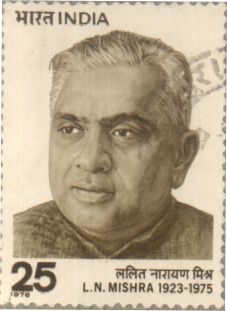In 1975, former Railway Minister Lalit Narayan Mishra was killed in a murder case. That happened about 40 years ago. The criminal trial in that case is still going on for about 40 years. This is in fact one of the oldest criminal trial cases, if not the oldest. Recording of evidence and hearing of the final arguments have been completed in this case, and the judgment of the court is likely to be delivered tomorrow (8 December 2014) by the Sessions Judge Shri Vinod Goel in New Delhi.

There are four accused persons in this case, including an advocate Ranjan Dwivedi, who was merely 24 years old at the time of the said murder in 1975. Now he is about 64 years of age.
A total of about 161 prosecution witnesses and more than 40 defence witnesses had been examined in this case. Final arguments were commenced sometime in 2012. The judgment in this case was earlier expected to be delivered in November 2014, however that date was postponed to 8 December 2014.
It is pertinent to point out that the former Railway Minister L.N. Mishra had died in a bomb blast that took place on 2 January 1975 at the Samastipur Railway Station in Bihar. This case was investigated by the CBI.
However, it is unfortunate that it has taken about 40 years to complete the trial of this case. In fact, this is just the trial, i.e., the first stage of the judicial process. There could be further delay in criminal appeal which may be filed in the High Court and then in the SLP which may be filed in the Supreme Court. This shows the kind of delay that occurs in judicial processes in India. In fact, at the last count, there are more than 3 crore cases pending in India in different courts.
It is worth noting that the accused Ranjan Dwivedi had recently moved the Supreme Court for quashing of the criminal case against him in view of the inordinate delay in the criminal trial (at that time, the trial was pending for about 37 years). However, in the judgment reported vide Ranjan Dwivedi v. CBI, (2012) 8 SCC 495, the Supreme Court rejected his prayer for quashing of the case against him, holding that unintentional and unavoidable delays or administrative factors over which the prosecution has no control, such as, overcrowded court dockets, absence of the Presiding Officers, strike by the lawyers, the matter pending before the other forums, including the High Courts and the Supreme Court and adjournment of the criminal trial at the instance of the accused, etc., may be a good cause for the failure to complete the trial within a reasonable time. Therefore, in spite of the fact that right to speedy trial had been declared by the Supreme Court to be a part of the fundamental right guaranteed under Article 21 of the Constitution of India, even a delay of 37 years in a criminal trial was considered not enough for quashing of the criminal case. [See my article: The illusory right to speedy trial for more details.]
This criminal trial has now been completed and the judgment is expected tomorrow (8 December 2014). Hopefully, such long delays will not occur in other criminal cases, though it is not uncommon to find criminal trials remaining pending for more than 20 years.
One also hopes that some drastic measures would be taken by the higher judiciary as well as by the Governments of the Centre and States to improve the sorry state of affairs in the pending cases with judiciary. So far, other than making promises, nothing serious has been done to improve the pendency situation in the courts.

